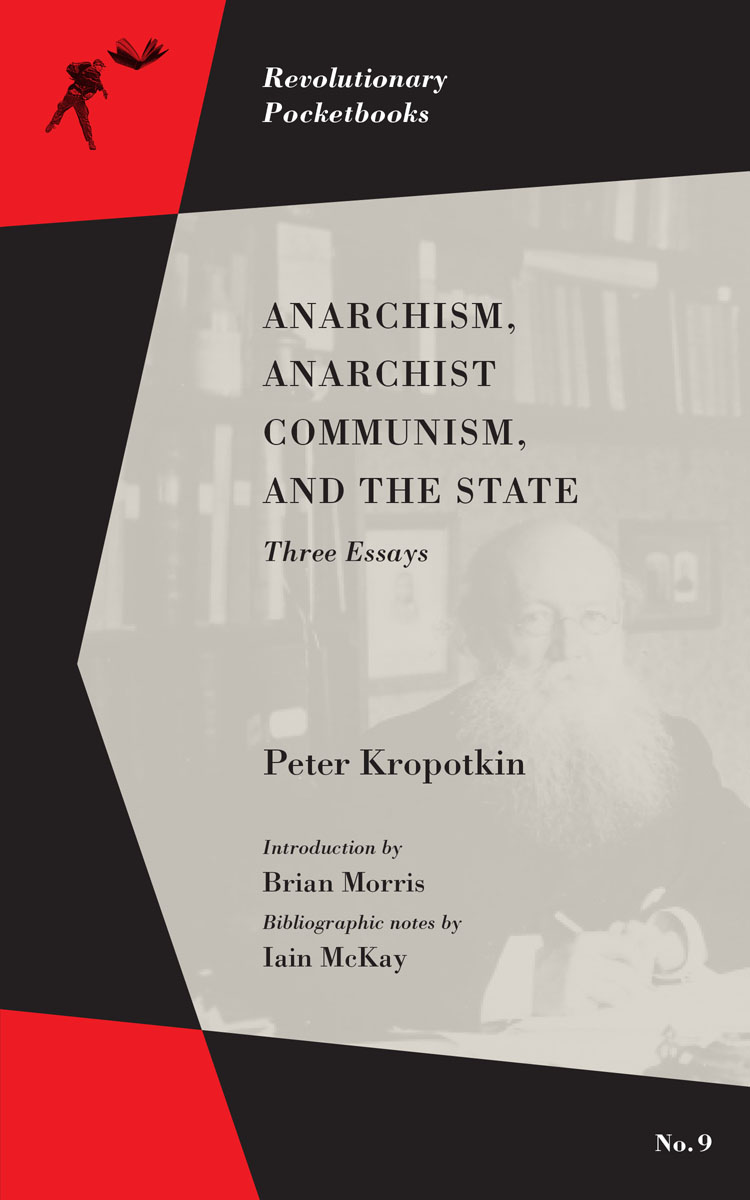


Revolutionary Pocketbooks
Eclipse and Re-emergence of the Communist Movement
Gilles Dauv and Franois Martin
Voices of the Paris Commune
edited by Mitchell Abidor
From Crisis to Communisation
Gilles Dauv
Death to Bourgeois Society: The Propagandists of the Deed
edited by Mitchell Abidor
Maoism and the Chinese Revolution: A Critical Introduction
Elliott Liu
Anarchy and the Sex Question: Essays on Women and Emancipation, 18961926
Emma Goldman edited by Shawn P. Wilbur
For a Libertarian Communism
Daniel Gurin edited by David Berry
The Permanent Guillotine: Writings of the Sans-Culottes
edited by Mitch Abidor
Anarchism, Anarchist Communism, and The State: Three Essays
Peter Kropotkin introduction by Brian Morris
New Fields: Early Reflections on Anarchism
Max Nettlau edited by Shawn P. Wilbur
Anarchism, Anarchist Communism, and The State: Three Essays
Peter Kropotkin
This edition copyright 2019 PM Press
All rights reserved. No part of this book may be transmitted by any means without permission in writing from the publisher.
ISBN: 978-1-62963-575-0
Library of Congress Control Number: 2018931533
Cover by John Yates/Stealworks
Layout by Jonathan Rowland based on work by briandesign
10 9 8 7 6 5 4 3 2 1
PM Press
PO Box 23912
Oakland, CA 94623
www.pmpress.org
Printed in the USA
 CONTENTS
CONTENTS INTRODUCTION
INTRODUCTIONBY BRIAN MORRIS
The present is where we get lostif we forget our past and have no vision of the future.
So wrote the Ghanaian poet Ayi Kwei Armah.
The anarchist geographer Peter Kropotkin is certainly a figure from our past that we should not forget. A talented geographer, a pioneer ecologist and a revolutionary socialist, Kropotkin generated a treasury of fertile ideas (as his friend Errico Malatesta put it) that still have contemporary relevance. During his own lifetime, he was perhaps the most important and influential anarchist theoretician. Even the redoubtable Emma Goldman described Kropotkin as my teacher.
Indeed, we need to stress that Kropotkin, like Michael Bakunin, is not just some historical curiosity or Russian relic of interest only to academic scholars, for his extraordinary life, his seminal writings, and his vision of a world free of political oppression and economic exploitation continue to be a source of inspiration and ideasat least to evolutionary naturalists and libertarian socialists.
Born in Moscow in 1842, it is one of the curious ironies of history that Kropotkin, who became one of the fiercest opponents of all forms of State power, was born into the highest rank of the Russian aristocracy, for his princely forbears had been among the earliest rulers of Russia. Educated at an elite military academy, Kropotkin joined a newly formed Cossack regiment and spent his youthful years largely engaged in exploring and undertaking scientific research in the remote regions of Manchuria and Siberia. His travels and research gave Kropotkin not only a keen sense of independence but established early his reputation as a unique and talented scientistspecifically in the field of physical geography. Kropotkins portrait still hangs in the library of the Royal Geographic Society in London.
Having resolved not to devote his life purely to academic scholarship, Kropotkin took a sharp turn in 1872. On a visit to Zurich, Kropotkin became involved with the International Working Mens Association. Switzerland was then a Mecca of international socialism, a meeting place not only for Russian exiles, but also a refuge for many French socialists who had been involved in the Paris Commune of 1871. Kropotkin thus became an anarchista libertarian socialist.
Returning to St. Petersburg, Kropotkin joined a small group of revolutionary Narodniks (populists), the Chaikovsky Circle, and in 1874 was arrested for conspiring against the sacred person of the Russian tsar. The two years Kropotkin spent imprisoned in the Peter and Paul Fortress and his subsequent dramatic escape are vividly described in Kropotkins own autobiography Memoirs of a Revolutionist (1899).
During the years 1877 to 1882, Kropotkin travelled widely throughout Europe, engaged in anarchist propaganda and became deeply involved with the Jura Federation in Switzerland. Together with Franois Dumertheray, lise Reclus, Errico Malatesta, Carlo Cafiero and others, Kropotkin was instrumental in establishing anarchist communism (or libertarian socialism) as a political movement and tradition. Kropotkin always insisted that anarchist communism was not the creation of an intellectual elite but emerged from within the international working-class movement.
Inevitably, in 1883, Kropotkin was arrested in France for belonging to an illegal political organisationthe International Working Mens Association. He spent three years in Clairvaux Prison, to be finally released in January 1886. Like Marx before him, Kropotkin came to London and remained in Britain as an honourable exile (as author Nicolas Walter described him) for the next thirty years, until his return to Russia after the 1917 revolution.
During his many years of exile, Kropotkin not only became the foremost theoretician of anarchismand an inspiration to many socialistsbut, as anthologist Iain McKay stresses, was always involved in concrete political struggles as a militant anarchist. During these same years, Kropotkin earned his living as a scientific journalist, as well as producing a steady stream of articles, pamphlets and books. They include, for example, specifically anarchist writings, such as Words of a Rebel (1885) and The Conquest of Bread (1892); studies in social ecology, Fields, Factories and Workshops (1895) and Mutual Aid: A Factor in Evolution (1902); and an impressive historical study, The Great French Revolution (1909), which so excited Lenin. Kropotkin was an extraordinarily well-read scholar who produced well-researched and lucidly and engagingly written books.
A true pioneer, as well as being a kind and amiable man, Kropotkin not only outlined the basic tenets of anarchist communism as a political tradition but expressed in embryonic form a new metaphysics of natureevolutionary naturalism. Contemporary academics who dismiss Kropotkin as a mechanistic materialist or positivist simply fail to understand that Kropotkin was fundamentally a historical thinker, and following in the footsteps of Alexander von Humboldt and Charles Darwinboth kindred spiritsadvocated a form of evolutionary naturalisma metaphysic that stressed the importance of novelty, spontaneity, flux and self-organisation in the evolution of life on earth.
As is well-known, in 1914, to the surprise and dismay of his anarchist friends, Kropotkin supported the allies against Germany at the outbreak of the First World War, motivated, it seems, by an extreme antipathy towards German militarism. Most anarchists, including, for example, Malatesta, felt that Kropotkin had completely betrayed his anarchist principles. Three years later, in declining health, Kropotkin returned to Russia, spending his last years writing a study of
Next page


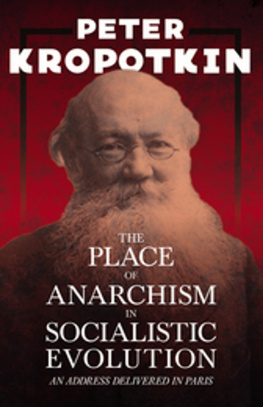
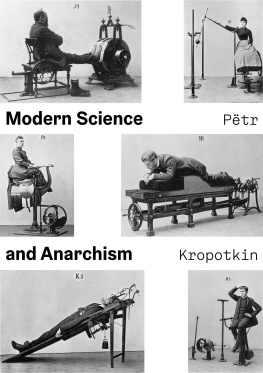
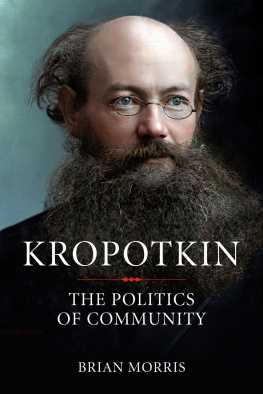
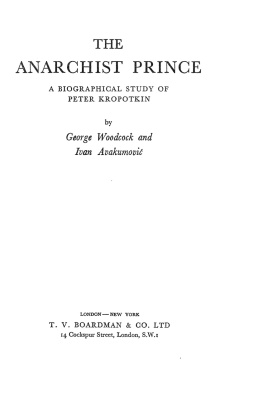

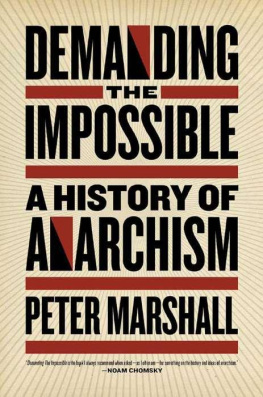
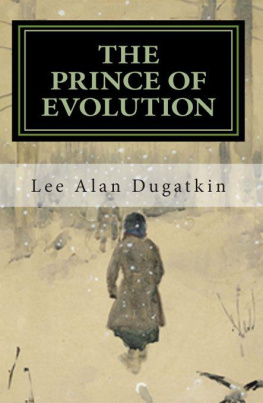



 CONTENTS
CONTENTS